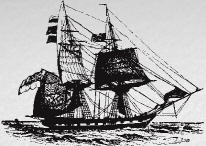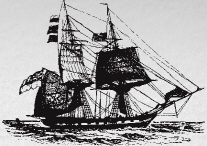Isle of Swords (2 page)
She looked up at him. “I heard a monster out in the sea!”
“A monster? My darling daughter, you heard the thunder and the wind, that's all.” He snuggled her in close beneath his coat.
“There are no monsters in the sea. It's a storm.”
“But it's a big storm!” she whimpered.
“No, not big. Just noisy.” But this voice was not her father's.
Dolphin peeked out from her father's coat and grinned. It was Brand, the young ship's mate she'd teased since they left port.
You're my blond monkey
, she'd said to Brand. And most times, he'd laugh, make chimp noises, and scurry up the nearest rope ladder or rigging. Now, the wind whipped his long hair about his face. Dolphin saw him wink and felt her heart flutter.
“I'm still scared,” she said.
“It's just a squall,” Brand said confidently. “Captain Halifax will see us through. And the
Trafalgar
is the pride of His Majesty's fleet! Now, you mind your father and go back to your quarters 'til it blows over.” And just like that, he was gone across the deck.
“There, you see?” said Dolphin's father. “No monsters. Just a storm.” He looked down at his precious little girl. Her bright coppery locks were matted against her pale cheeks.
Dolphin stared back, but up beyond her father, following the mainmast through shrouds of rigging, past the crow's-nest, and into the turbulent gray sky. Lightning slashed overhead, and Dolphin ducked again into her father's coat. Thunder crashed, and the entire ship trembled.
“Papa!” she cried. He gave her a brave smile and cradled her head against his chest. He hoped she couldn't hear his heart hammering away. “There, there, my Dolphin. Remember what Brand said. It will all be over soon. Now, let's get you back to our quarters and snug in bed.”
“But, Papa, I want to stay here with you!”
“No, you will be much safer below,” he replied, a slight edge to his voice. “I have work to do. I'm helping the quartermaster. He's waiting for me . . . see?” He pointed to the grizzled graybeard sailor near the mast. He nodded and grinned at Dolphin. Suddenly, Dolphin clutched her father's leg. She stared, pointing past the quartermaster, past the mainmast, out into the rolling sea. “What's that?”
An enormous ship appeared in the distance. It was tall, with at least three masts, and narrowed sharply at the bow. It knifed through the waves, driving toward them.
Dolphin's father bent low and held his little girl by the shoulders.
“Stay here,” he whispered urgently. He ran to the quartermaster and pointed out into the sea.
“Pirates,” hissed the quartermaster.
“Pirates? In the middle of the storm?”
The quartermaster did not reply immediately. He stared out into the sea. Abruptly, he took in a sharp breath and went very rigid. He grabbed Dolphin's father by the shoulder of his coat and practically dragged him back across the deck. “Get your daughter down below,” he said as they drew near the ship.
“Come, my child,” Dolphin's father said, his voice taut. “We must go to our quarters.”
“But, Papa, the ship . . . who are they?”
“No one to worry about, Dolphin.”
“You best not lie to your daughter.” The quartermaster's voice was flat, terrifyingly void of emotion. “That ship . . . it's the
Raven
.
Bartholomew Thorne.”
Dolphin's father felt the blood in his veins turn to ice at the uttering of that name. He whisked his daughter off the deck and raced for the cabins. He banged awkwardly through a door. “I'm so sorry, Dolphin,” he managed to say. He could feel her trembling against him. He held her close and continued running. A hundred thoughts raced through his mind: memories, hopes, regrets.
“Papa!” she pleaded as they plunged into their cabin.
He sat down with her on the bed and snuffed the candle in the lantern. As darkness enveloped them, he said, “Don't worry, my precious daughter. It will all be over soon.”
And he began to pray.

A
cannon shot, deep and sudden, trailed off like a peal of thunder. Something cold touched his fingertips. Another shot.
Run them all out, boys!
Water trickled over his hand.
She's taking on something awful!
Bosun, pitch that leak!
Another shot, nearer still. Water surged into his mouth and nose. A wave partially submerged his head and sprayed his back.
He woke, jerked his head up from the surf, and flailed onto his side. His face, his arms, his back all throbbed and burned. “What happened?” he moaned, coughing up seawater and grinding sand between his teeth. He could not see.
Has someone cut out my eyes?
Hands trembling, he reached up. His eyes were swollen and caked shut . . . but at least they were there.
After several painful attempts, he managed to pry them open. Brilliant white light knifed in. He clutched at his face. His head throbbed, sun blazed mercilessly off the white sand, but slowly his eyes adjusted. He squinted under a cloudless blue sky and saw water. As another wave raced toward him, he rose to one knee. That little bit of movement brought tremendous pain. It felt as if there were shards of glass embedded in his skin.
With another groan, he stood. He reached over his shoulder and, between the tatters of his shirt, felt ripped flesh, sticky and wet. His fingertips came back glistening with blood, and he became lightheaded. He swayed for a moment, then steadied himself and looked around. Across a slope of white sand there stood a deep copse of treesâmostly tall palms, surrounded by sea grape and divi-divi trees. He stared at the leaning, gnarled trunks. Divi-divi trees always leaned to the southwest. That meant something . . . he felt sure it did, but he could not grasp what. He looked along the tree line, up and down the shore, and, again, out to sea. “I don't know this place,” he whispered.
He grabbed fistfuls of his matted blond hair. His welted face felt foreign . . . like someone else's. A sharp ringing came to his ears. The world seemed to spin. “Who am I? Why can't I remember?”
A flash of green racing across the sand drew his attention, and he turned. At his feet, a large iguana sat gnawing at the leather drawstring of a pouch that lay half-buried in the sand.
Brushing aside the lizard, he picked up the fist-sized pouch. It had some weight to it. “Is this mine?” he wondered aloud. He thought it had to be, but nothing about it seemed familiar. Still, when he loosened the drawstring and began to pour out its contents, he couldn't help but feel a strange gravity weighing upon him.
A sparkling green stone fell into his hands first. It was shaped like an almond, but much larger. The brilliant sun flickered within it as if the stone were alive with fire at its core. Next, a lock of lustrous red hair dropped out and lay in his palm close to the jewel. The hair was a little damp but still very soft. He ran a finger lightly over it, wondering. . . .
The surf raced in and covered his feet, just as the last itemâa tarnished silver crossâfell into his palm. Ancient it lookedâand not just from the tarnish. It bore strange markings and a script of some design, but he could not read it.
He dropped the three tokens into the pouch. He did not recognize any of these things. Nothing made any sense! His head ached. Weak and confused, he watched as an iguana scurried away and disappeared over the slope. Then he froze, for nearby the lizard's trail was a trail of footprints. They wound away from the trees, down from the slope, almost directly to where he stood. A wave crashed with a sound like a cannon shot . . . or maybe, more like the crack of a whip, and he jumped.
The ringing came back to his ears, and he felt dizzy. As his vision blurred, he looked at the footprints leading up to where he stood. The thought
I am not alone
flashed into his mind before everything around him faded into darkness.

W
hat is it now?!” bellowed Captain Declan Ross. The pounding on his cabin door had made him knock over his mug. His lightning reflexes had just barely saved the sea chart from the spill. Only one sailor aboard the
William Wallace
would have the nerve to bang on the captain's door like that.
The quartermaster, a West Indian sailor named Stede, threw open the door, blatantly ignoring the custom of waiting to be asked to enter. “This old ship will burst at the very hullâif ya don't find us a place to careen her!”
Ross raised a coppery eyebrow and glared at his longtime friend.
“She's taking on watah below decks, mon!”
“What?” Ross stood. “I thought Midge patched those leaks.”
Stede's nostrils flared. “Him did, mon, but it b' gettin' warse.
The ship has four days . . . a week tops. B' true.”
“I know,” Ross replied with a shrug. “You're right. You're always right when it comes to the
Wallace
. Is the wind still light?” he asked, knowing the answer already. He could feel the ship rolling heavily on the ponderous swells of the sea.
“Just a breath,” Stede answered, shaking a fist at the ceiling. “I think we may b' on the edge of the doldrums. . . . just b' a feeling.”
Ross frowned. Stede's feelings were usually right too. If they were caught in the open sea with no wind and the ship coming apart at the seams . . . he shook his head. “I hope you're wrong. I have no desire to dance with the sharks anytime soon. Come here and look at this,” Ross said.
Stede joined him at the desk. “Given the wind and the time you gave me, we might be able to get to this little group of cays.”
Stede whistled. “They b' Thorne's isles.”
“He can't cover them all!” Ross exclaimed. “He doesn't have enough ships . . . at least not yet.”
“Life's hard,” Stede said. He whistled again. “So, we'll make the hard choice. But we better pray that we don't get caught ashore by that wicked mon.”
Stede left without another word. Captain Ross knew he didn't have to give the command. Stede would plot the course. Sure enough, in just a few minutes, Ross felt the
Wallace
slowly turn to the south.
Another knockâthis one more a tapâat the cabin door. The door opened, and there stood a dumpy man with a walrus of a moustache and with just a stump at the elbow to serve as one of his arms. In his one hand, he held a wooden spoon. He stood there waiting.
“Come in, Nubby. What can I do for you?”
“Well, Cap'n, you could get me to port so's I can get some fresh meat! No fish is hitting the nets. We've got nothin' left but hardtack and some moldy vegetables!”
Ross stared down at his sea chart. “What happened to those dog-sized rats you've been serving?”
“Cap'n, we ate 'em all. All's left is them little boney ones, and the men'll complain if I have to start serving those!” Nubby replied.
“The men will eat what they are served and be glad to get it,”
Ross stated without looking up from the chart. “And Nubs, cut the rations.”
“This'll make the third time, Cap'n.”
“Do you see a choice, Nubs?” Ross asked, looking straight at the cook.